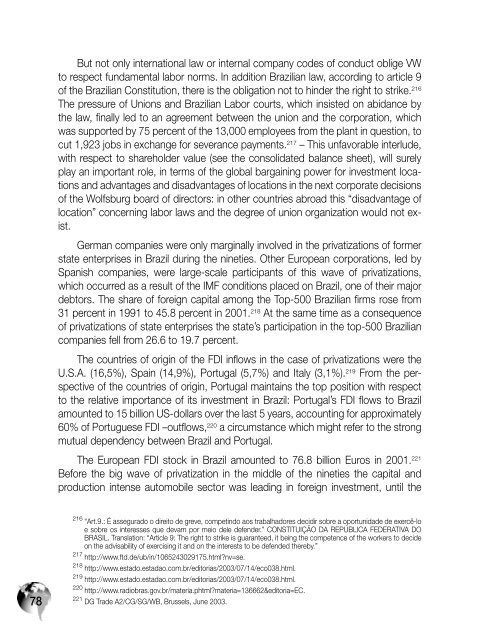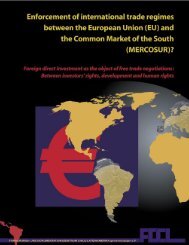Download - FDCL
Download - FDCL
Download - FDCL
You also want an ePaper? Increase the reach of your titles
YUMPU automatically turns print PDFs into web optimized ePapers that Google loves.
78<br />
But not only international law or internal company codes of conduct oblige VW<br />
to respect fundamental labor norms. In addition Brazilian law, according to article 9<br />
of the Brazilian Constitution, there is the obligation not to hinder the right to strike. 216<br />
The pressure of Unions and Brazilian Labor courts, which insisted on abidance by<br />
the law, finally led to an agreement between the union and the corporation, which<br />
was supported by 75 percent of the 13,000 employees from the plant in question, to<br />
cut 1,923 jobs in exchange for severance payments. 217 – This unfavorable interlude,<br />
with respect to shareholder value (see the consolidated balance sheet), will surely<br />
play an important role, in terms of the global bargaining power for investment locations<br />
and advantages and disadvantages of locations in the next corporate decisions<br />
of the Wolfsburg board of directors: in other countries abroad this “disadvantage of<br />
location” concerning labor laws and the degree of union organization would not exist.<br />
German companies were only marginally involved in the privatizations of former<br />
state enterprises in Brazil during the nineties. Other European corporations, led by<br />
Spanish companies, were large-scale participants of this wave of privatizations,<br />
which occurred as a result of the IMF conditions placed on Brazil, one of their major<br />
debtors. The share of foreign capital among the Top-500 Brazilian firms rose from<br />
31 percent in 1991 to 45.8 percent in 2001. 218 At the same time as a consequence<br />
of privatizations of state enterprises the state’s participation in the top-500 Brazilian<br />
companies fell from 26.6 to 19.7 percent.<br />
The countries of origin of the FDI inflows in the case of privatizations were the<br />
U.S.A. (16,5%), Spain (14,9%), Portugal (5,7%) and Italy (3,1%). 219 From the perspective<br />
of the countries of origin, Portugal maintains the top position with respect<br />
to the relative importance of its investment in Brazil: Portugal’s FDI flows to Brazil<br />
amounted to 15 billion US-dollars over the last 5 years, accounting for approximately<br />
60% of Portuguese FDI –outflows, 220 a circumstance which might refer to the strong<br />
mutual dependency between Brazil and Portugal.<br />
The European FDI stock in Brazil amounted to 76.8 billion Euros in 2001. 221<br />
Before the big wave of privatization in the middle of the nineties the capital and<br />
production intense automobile sector was leading in foreign investment, until the<br />
216 “Art.9.: É assegurado o direito de greve, competindo aos trabalhadores decidir sobre a oportunidade de exercê-lo<br />
e sobre os interesses que devam por meio dele defender.” CONSTITUIÇÃO DA REPÚBLICA FEDERATIVA DO<br />
BRASIL. Translation: “Article 9: The right to strike is guaranteed, it being the competence of the workers to decide<br />
on the advisability of exercising it and on the interests to be defended thereby.”<br />
217 http://www.ftd.de/ub/in/1065243029175.html?nv=se.<br />
218 http://www.estado.estadao.com.br/editorias/2003/07/14/eco038.html.<br />
219 http://www.estado.estadao.com.br/editorias/2003/07/14/eco038.html.<br />
220 http://www.radiobras.gov.br/materia.phtml?materia=136662&editoria=EC.<br />
221 DG Trade A2/CG/SG/WB, Brussels, June 2003.









